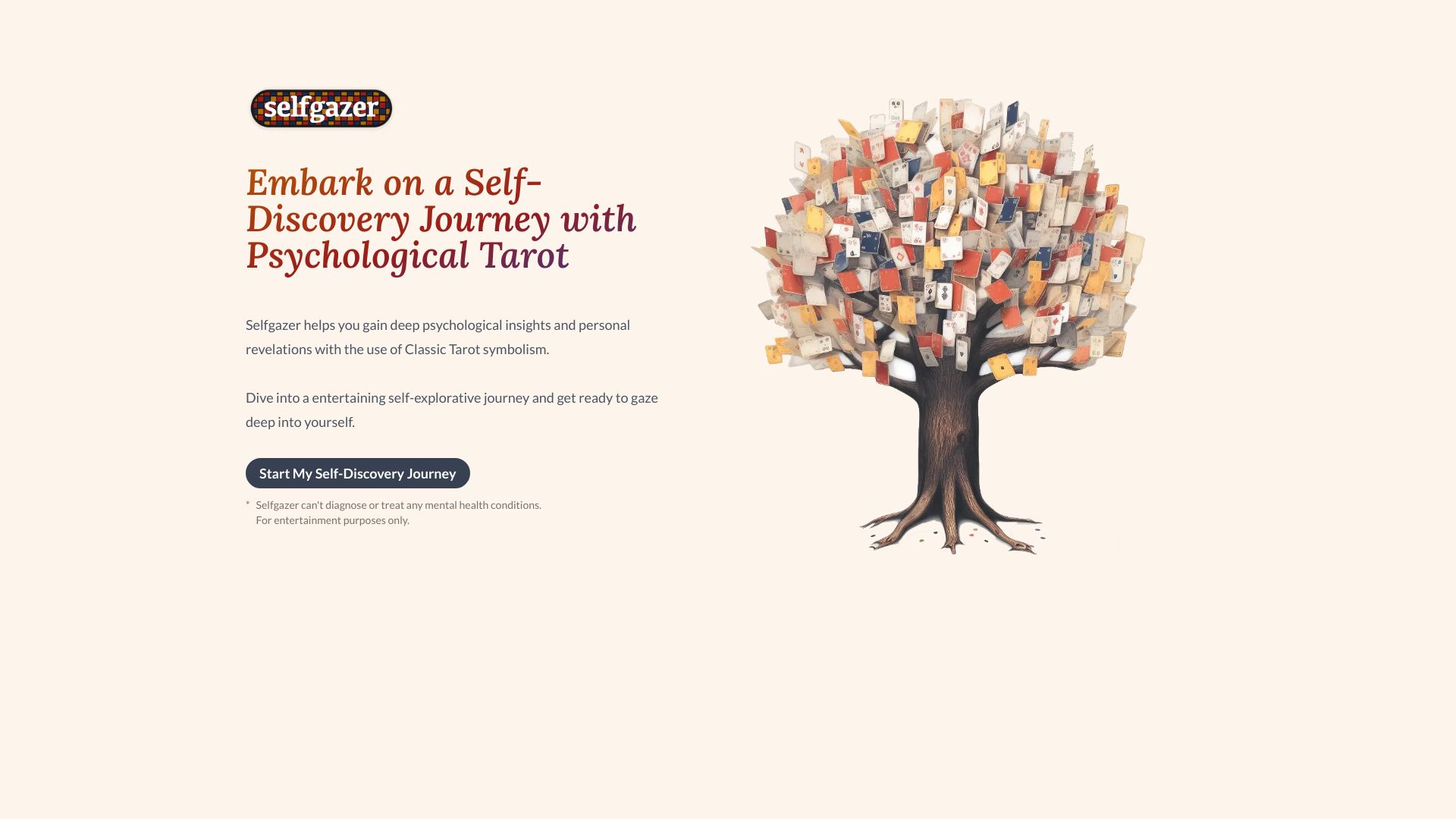- Home
- AI Dream Interpreter
- Selfgazer

Selfgazer
Open Website-
Tool Introduction:Tarot-powered insights for self-reflection. Guidance, not therapy.
-
Inclusion Date:Oct 28, 2025
-
Social Media & Email:
Tool Information
What is Selfgazer AI
Selfgazer AI is an experience designed to guide self-reflection through psychological Tarot readings rooted in Classic Tarot symbolism. It blends archetypal imagery with AI-guided narratives to help you surface patterns, emotions, and motivations, offering prompts that support personal insight and self-discovery. Rather than predicting the future, it frames Tarot as a mirror for the mind—useful for journaling, intention-setting, and mindful decision-making. Selfgazer is for entertainment and personal exploration only; it cannot diagnose or treat any mental health conditions.
Selfgazer AI Main Features
- Psychological Tarot readings: AI-guided interpretations that use Classic Tarot symbolism to explore inner themes, values, and perspectives.
- Archetype-centered insights: Reflections grounded in archetypes and narrative meaning-making rather than fortune-telling.
- Reflective prompts: Gentle questions that encourage journaling, intention-setting, and actionable takeaways.
- Beginner-friendly explanations: Clear, accessible language that makes Tarot symbolism understandable without prior expertise.
- Ethical boundaries: Transparent framing for entertainment and self-exploration; no clinical claims or mental health diagnosis.
- Focus on agency: Emphasis on personal context and self-directed growth rather than deterministic answers.
Selfgazer AI Suitable For
Selfgazer AI suits individuals seeking structured self-reflection, journaling enthusiasts, mindfulness practitioners, and anyone curious about Classic Tarot symbolism as a tool for self-understanding. Coaches, facilitators, and educators can also use it to spark safe, non-clinical conversations about values and perspectives in workshops or group settings.
Selfgazer AI How to Use
- Open Selfgazer AI and start a new session focused on self-exploration.
- Set an intention or describe a theme you want to reflect on (e.g., work, relationships, creativity).
- Receive an AI-guided Tarot reading that interprets Classic Tarot symbolism through a psychological lens.
- Review the reflective prompts and note what resonates with your current context.
- Capture insights in your journal and outline one small action or mindset shift to test.
- Revisit your notes over time to observe patterns and refine your personal insights.
Selfgazer AI Industry Use Cases
In coaching and personal development, practitioners can use Selfgazer AI to open sessions with values-based reflections that stay non-clinical. Creative teams may leverage archetypal prompts to overcome blank-page syndrome and generate narrative directions. In education and workshops, instructors can use it to teach symbolism, storytelling, and perspective-taking, helping participants reflect on decisions without presenting clinical advice.
Selfgazer AI Pros and Cons
Pros:
- Provides structured, AI-guided self-reflection with clear, accessible Tarot symbolism.
- Encourages journaling and intentional action rather than passive consumption.
- Non-clinical, ethical framing suited for entertainment and personal exploration.
- Useful for beginners and experienced users interested in archetypal psychology.
Cons:
- Not a substitute for therapy or professional mental health support.
- Symbolic interpretations may feel abstract or generic to some users.
- Insight quality depends on user context-sharing and willingness to reflect.
- Those seeking predictive readings may find the psychological focus mismatched.
Selfgazer AI FAQs
-
Is Selfgazer AI a replacement for therapy?
No. It is for entertainment and self-exploration only and does not diagnose, treat, or prevent any mental health conditions.
-
How does Selfgazer AI approach Tarot?
It uses Classic Tarot symbolism to prompt psychological reflection, emphasizing archetypes, narratives, and personal meaning rather than prediction.
-
Do I need prior Tarot knowledge?
No. Explanations are beginner-friendly and focus on accessible symbolism and reflective prompts.
-
What kind of questions work best?
Open-ended, reflective intentions such as “What perspective am I missing?” or “How can I move forward with clarity?” tend to yield more useful insights.
-
Can it predict the future?
No. The focus is on self-discovery and perspective-taking, not fortune-telling or deterministic outcomes.
